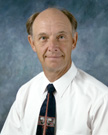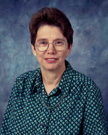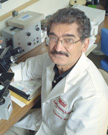Five UNMC faculty members will be receiving 30-year service awards during the Annual Faculty meeting Thursday, April 11 at 4 p.m. in the Eppley Science Hall Amphitheater. UNMC Today highlights the final three award recipients today with a look at Terry Hexum, Ph.D. and Anne Kessinger, M.D., of the College of Medicine, and Parviz Pour, M.D., of the Eppley Institute for Cancer Research.
College of Medicine
 Terry Hexum, Ph.D., is professor of pharmacology in the College of Medicine where he teaches autonomic and cardiovascular pharmacology to medical, pharmacy and physician assistant students. His teaching efforts have been recognized through several teaching awards. In addition, Dr. Hexum has taught in a variety of graduate courses and has been the adviser for several Ph.D. students.
Terry Hexum, Ph.D., is professor of pharmacology in the College of Medicine where he teaches autonomic and cardiovascular pharmacology to medical, pharmacy and physician assistant students. His teaching efforts have been recognized through several teaching awards. In addition, Dr. Hexum has taught in a variety of graduate courses and has been the adviser for several Ph.D. students.
His research interests are directed toward understanding the action mechanism of neuropeptides in cardiovascular function with particular emphasis on receptor cross-talk. His research program has been continually funded with current funding from the National Institutes of Health. Dr. Hexum has been a dedicated member of the faculty who has served on many committees and is currently president of the UNMC Faculty Senate.
 Anne Kessinger, M.D., is professor and associate director for clinical research at the UNMC Eppley Cancer Center. She is most recognized for her work in peripheral stem cell transplantation. In 1984, the nation’s first peripheral stem cell transplant was performed at UNMC largely as a result of Dr. Kessinger’s research. Today, the procedure Dr. Kessinger pioneered is standard care throughout the world.
Anne Kessinger, M.D., is professor and associate director for clinical research at the UNMC Eppley Cancer Center. She is most recognized for her work in peripheral stem cell transplantation. In 1984, the nation’s first peripheral stem cell transplant was performed at UNMC largely as a result of Dr. Kessinger’s research. Today, the procedure Dr. Kessinger pioneered is standard care throughout the world.
Dr. Kessinger has served as president of the American Association for Cancer Education, and has published papers related to circulating blood stem cells.
Eppley Institute for Cancer Research
 Parviz Pour, M.D., is a professor in the Eppley Institute for Research in Cancer and Allied Diseases and the department of pathology and microbiology. Dr. Pour has worked on many animal models in his studies dealing with ovarian and prostate, pancreatic and thyroid cancer. His major work has been on the histogenesis, early detection, prevention and therapy of pancreatic cancer. He was the first to establish a long-term culture of human islet and ductal cells.
Parviz Pour, M.D., is a professor in the Eppley Institute for Research in Cancer and Allied Diseases and the department of pathology and microbiology. Dr. Pour has worked on many animal models in his studies dealing with ovarian and prostate, pancreatic and thyroid cancer. His major work has been on the histogenesis, early detection, prevention and therapy of pancreatic cancer. He was the first to establish a long-term culture of human islet and ductal cells.